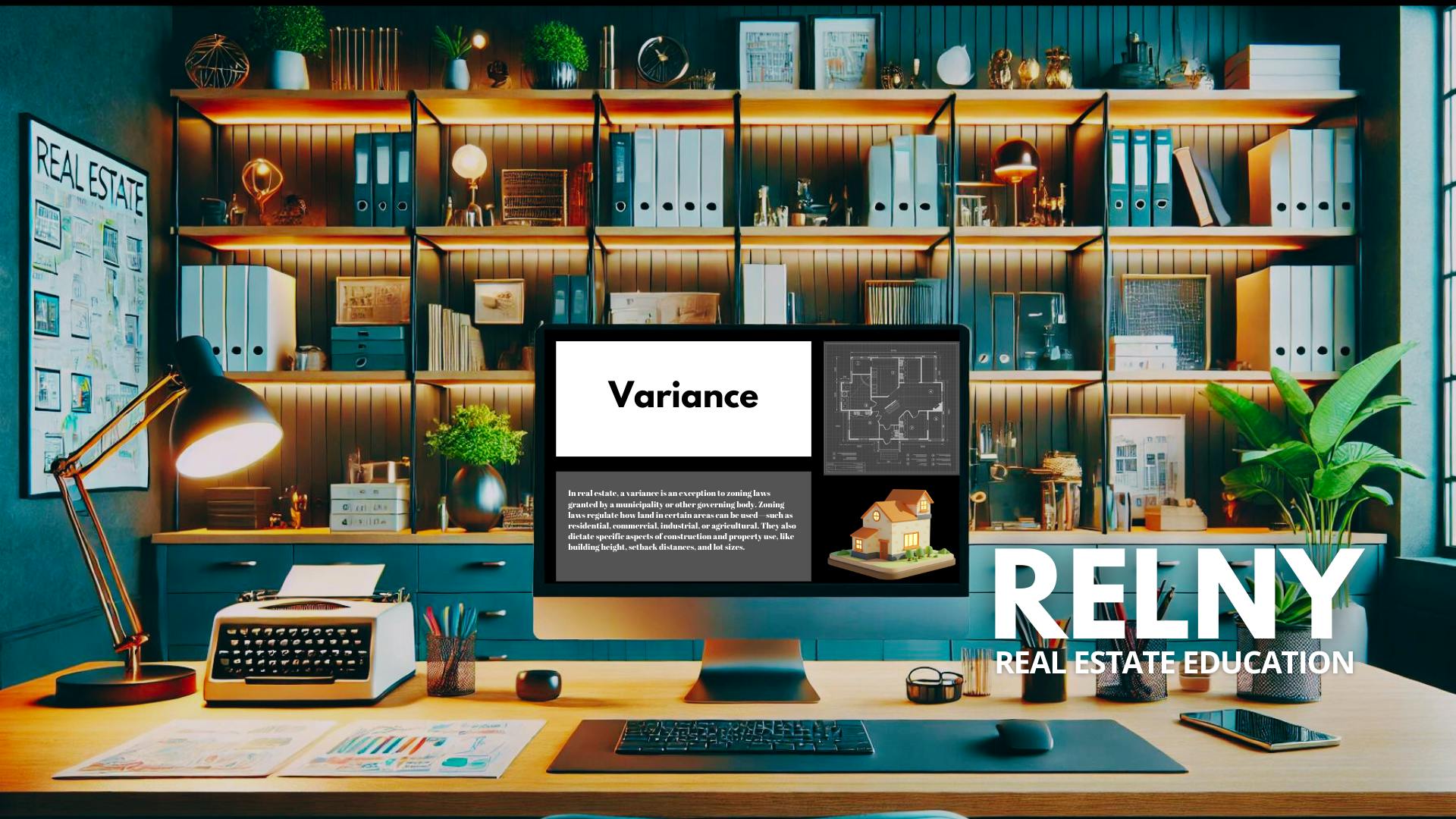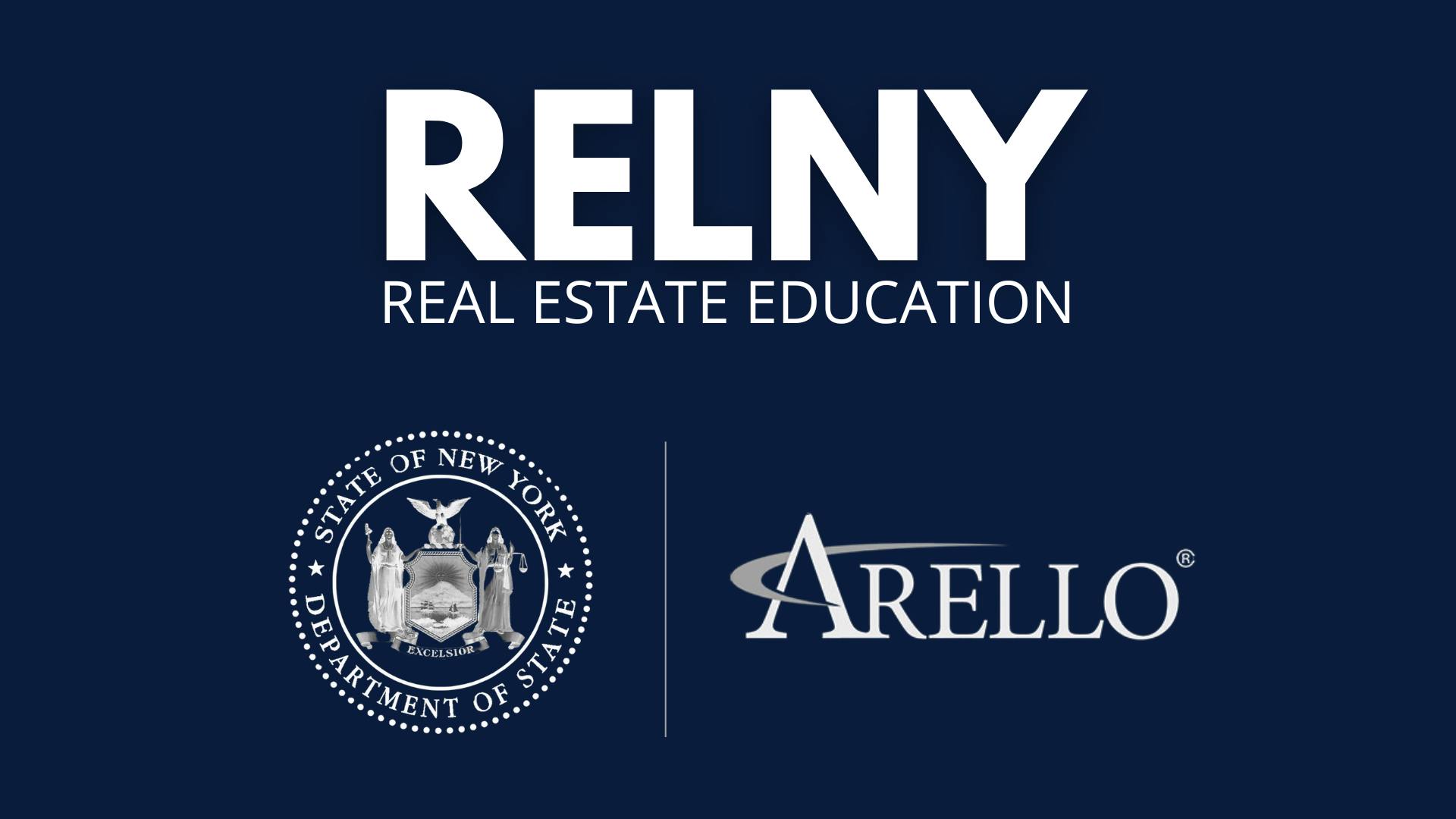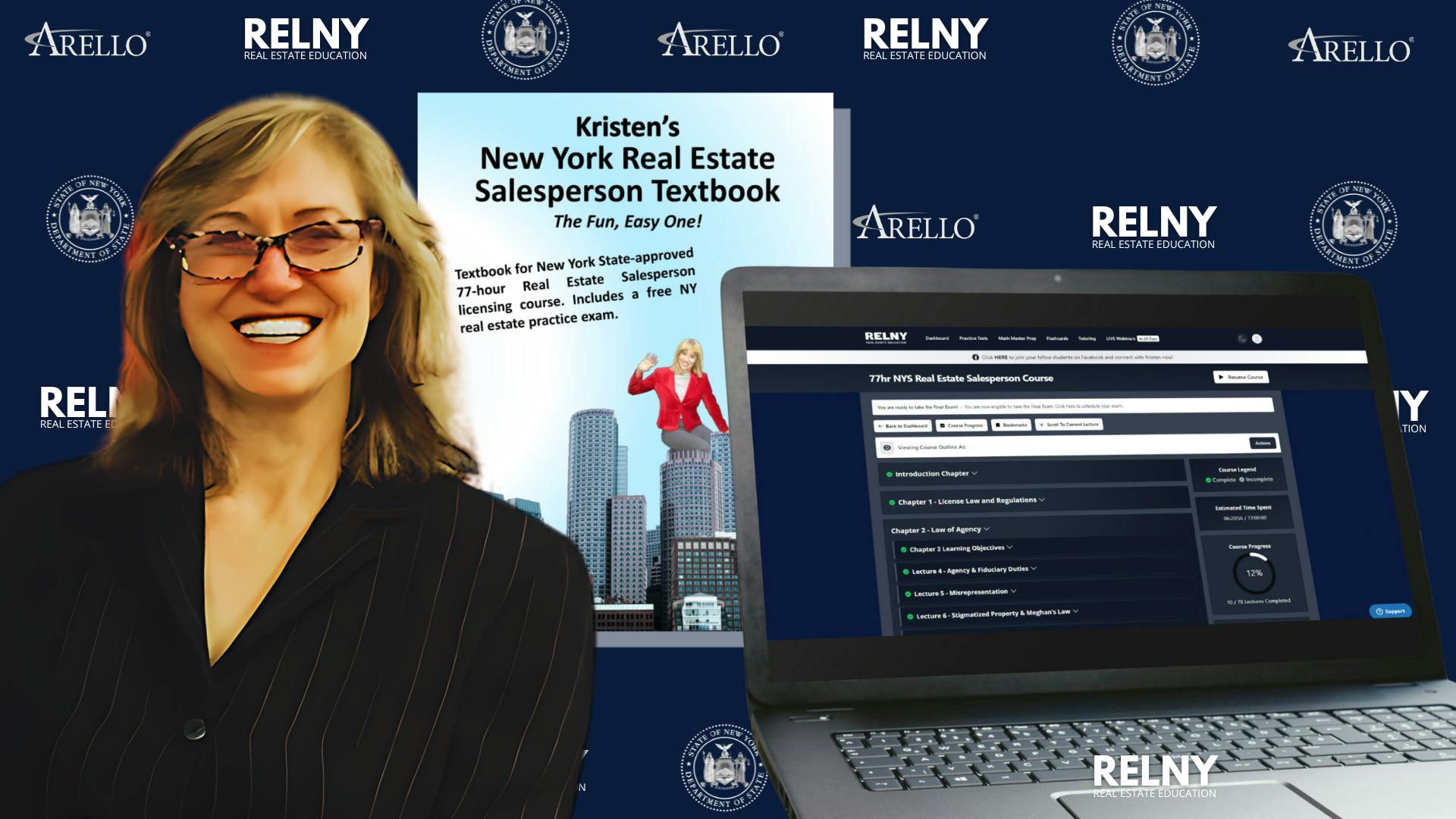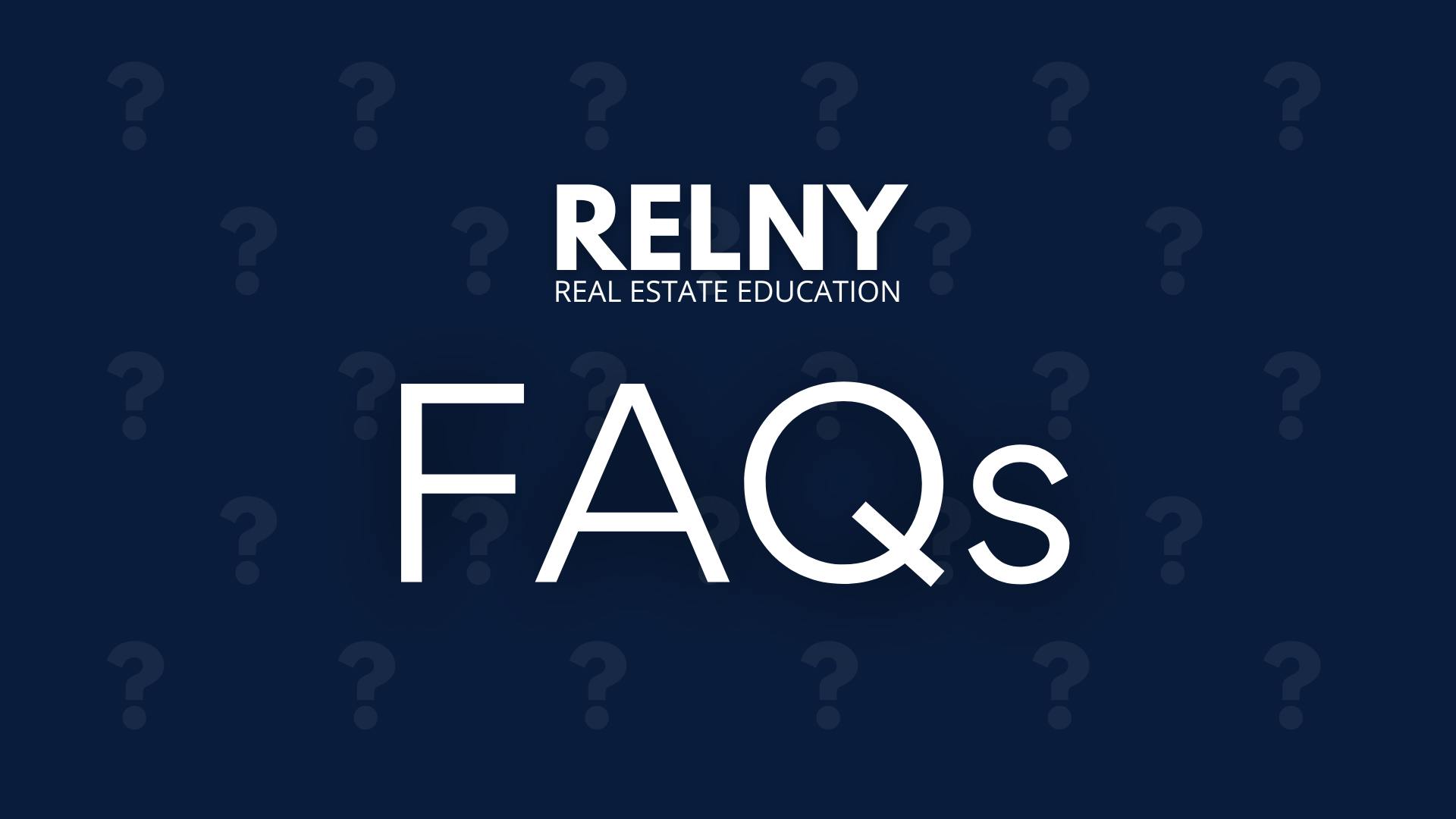Variance in Real Estate: A Key Term for Your Salesperson Licensing Exam
Understanding Key Concepts Like Variance is Critical to Passing the Real Estate Salesperson Licensing Examination

-
Course Certified & Accredited by NYS DOS & ARELLO®
-
77 Hour NYS Real Estate Salesperson Licensing Course
-
Live Office Hours with Kristen
-
Take Final Exam at Home
-
Kristen's 1:1 Private Tutoring
-
Subtitles/Transcripts for all languages offered by NYS DOS
-
Call/Text (877) 997-3569

Variance in Real Estate: A Key Term for Your Salesperson Licensing Exam
When preparing for the New York Real Estate Salesperson Licensing Exam, one term you'll encounter is Variance. Understanding what a variance is and how it applies to real estate transactions is crucial for any aspiring real estate agent. As a real estate licensing school, RELNY is here to help break down this concept to ensure you're ready for your exam and future career.
What is a Variance?
In real estate, a variance is an exception to zoning laws granted by a municipality or other governing body. Zoning laws regulate how land in certain areas can be used—such as residential, commercial, industrial, or agricultural. They also dictate specific aspects of construction and property use, like building height, setback distances, and lot sizes.
However, there are times when property owners wish to use their land in a way that doesn’t conform to the current zoning regulations. This is where a variance comes in. It provides property owners with the flexibility to deviate from strict zoning rules without altering the law itself. Essentially, a variance allows for a property to be used in a manner not otherwise permitted by zoning ordinances, but only under specific conditions and after approval by a zoning board.
Types of Variances
Understanding the two main types of variances is essential for your real estate exam:
- Area Variance
This allows for deviations from physical or dimensional requirements outlined in zoning regulations. For example, if a property owner wants to build closer to the property line than the zoning laws permit, they would apply for an area variance.
Common reasons include:
- Building too close to a neighbor's property (reduced setback).
- Constructing a building taller than the zoning allows.
- Increasing the lot coverage beyond the zoning limit.
- Use Variance
This permits a landowner to use their property in a way that is otherwise prohibited in the zoning district. For example, if a property is zoned for residential use, but the owner wants to open a small business on the premises, they would need a use variance. Use variances are generally harder to obtain than area variances because they involve changing the fundamental use of the land.
Why Understanding Variances Is Important for Real Estate Agents
Real estate agents must be well-versed in zoning laws and variances because they directly impact property value, development potential, and marketability. Here’s why this knowledge is crucial:
- Assisting Clients
When helping clients buy or sell properties, understanding zoning laws and the potential for variances can be a game-changer. For example, a buyer may be interested in building a larger garage or adding an extra structure on the property. Knowing whether a variance is possible can aid in negotiating the property price or advising clients on the feasibility of their plans.
- Navigating Transactions
Some properties are more valuable if variances can be obtained to expand their potential use. By knowing how to navigate the variance application process, you can guide clients more effectively through the complexities of zoning regulations.
- Avoiding Legal Issues
By understanding the limitations imposed by zoning laws and the importance of obtaining variances, you can help your clients avoid potential legal problems. Misuse of land or failure to comply with zoning requirements can lead to fines, lawsuits, or the need to reverse unauthorized property changes.
How to Obtain a Variance
To obtain a variance, the property owner must apply to the local zoning board. This process generally involves:
- Filing an Application
The owner submits an application outlining the specific variance requested and the reasons for it. Supporting documents, such as site plans, surveys, and architectural drawings, may be required.
- Public Hearing
A hearing is scheduled where community members can voice support or objections. This step ensures that the variance request is transparent and considers the interests of neighboring property owners.
- Board Review
The zoning board reviews the application and considers factors like the impact on the neighborhood, the nature of the hardship faced by the property owner, and whether granting the variance would set an undesirable precedent.
- Decision
The board votes to approve or deny the variance. If approved, the variance typically includes conditions the property owner must follow.
Factors for Granting a Variance
Zoning boards typically consider several factors before approving a variance:
- Hardship
For a use variance, the applicant must prove that strict enforcement of zoning regulations would cause unnecessary hardship. This often means showing that the property cannot be put to reasonable use without the variance.
- Impact on Surroundings
The variance must not alter the essential character of the neighborhood or negatively impact nearby properties.
- Minimum Necessary Change
The requested variance must be the minimum necessary to alleviate the hardship or allow reasonable use of the property.
Preparing for Your Exam
When preparing for your licensing exam, remember that understanding variance is part of knowing how zoning laws affect real estate.
Focus on these key points:
- What a variance is and the difference between area and use variances.
- The process of applying for a variance.
- The factors zoning boards consider when granting a variance.
At RELNY, we cover variances and other zoning-related topics in our Real Estate Salesperson Pre-Licensing course to help you master the concepts you'll need to succeed on your exam and in your real estate career.
Get Prepared for the Real Estate Salesperson Licensing Exam with RELNY
A solid understanding of variances is an invaluable skill for real estate agents. It allows you to provide better service to your clients, navigate complex transactions, and help clients make informed decisions about their property investments. By mastering the concept of variance through RELNY’s Real Estate Salesperson Pre-Licensing course, you’ll be well-equipped to pass your licensing exam and offer expert guidance in the real estate market.
Ready to start your journey toward becoming a licensed real estate agent? Enroll in RELNY’s 77-Hour Real Estate Salesperson Pre-Licensing Course today!

Complete List of RELNY Real Estate Accreditations
RELNY is proud to be fully accredited by both the New York State Department of State (NYS DOS) and the Association of Real Estate License Law Officials (ARELLO®). This accreditation is more than just a formal recognition; it serves as a testament to the high standards of education and training we provide in the real estate sector.
RELNY's Unparalleled Learning Advantage
Kristen Bacorn's Online Real Estate Courses are Produced Exclusively for RELNY. As New York’s #1 Real Estate Instructor, Kristen’s engaging teaching style and comprehensive curriculum make RELNY the ideal choice for anyone looking to excel in real estate.
Unlock Success with RELNY: Purpose-Built Course Software
In the fast-paced world of real estate education, having the right tools can make all the difference between merely passing an exam and truly excelling in your career. RELNY’s purpose-built course software offers a suite of features designed to elevate the learning experience, making it easier, more engaging, and highly effective for students.
Meet RELNY's Kristen Bacorn, New York's #1 Real Estate Instructor
• NYS Department of State & ARELLO® Certified
• Masters, Harvard University
• Commercial & Residential Real Estate Broker
• Educator at RELNY, SUNY, CUNY, NAR, AIA
• Addressed the United Nations 2X
• Interviewed by Wall St. Journal & New York Times
RELNY FAQs
At RELNY, we understand that embarking on a career in real estate is a significant step, and choosing the right educational path is crucial. As the premier New York real estate school, we are dedicated to providing our students with the highest quality education and support. This FAQ page is designed to address some of the most common questions prospective and current students have about our courses and exam prep.
RELNY Job Placement Solutions: Your Bridge to Success
At RELNY, we are committed to more than just providing a top-tier real estate education—we're dedicated to ensuring our students thrive in their careers post-graduation. Our comprehensive Job Placement Solutions & Services are designed to support you every step of the way as you transition from being a student to a successful real estate professional.
Become a Licensed Real Estate Agent with RELNY Instructor Kristen Bacorn
Learn how to become a New York real estate agent from Kristen Bacorn - the #1 Real Estate Instructor in New York. Our accredited New York real estate licensing course can be completed in 1 week and can be taken online from the comfort of your home, or from your mobile phone.






